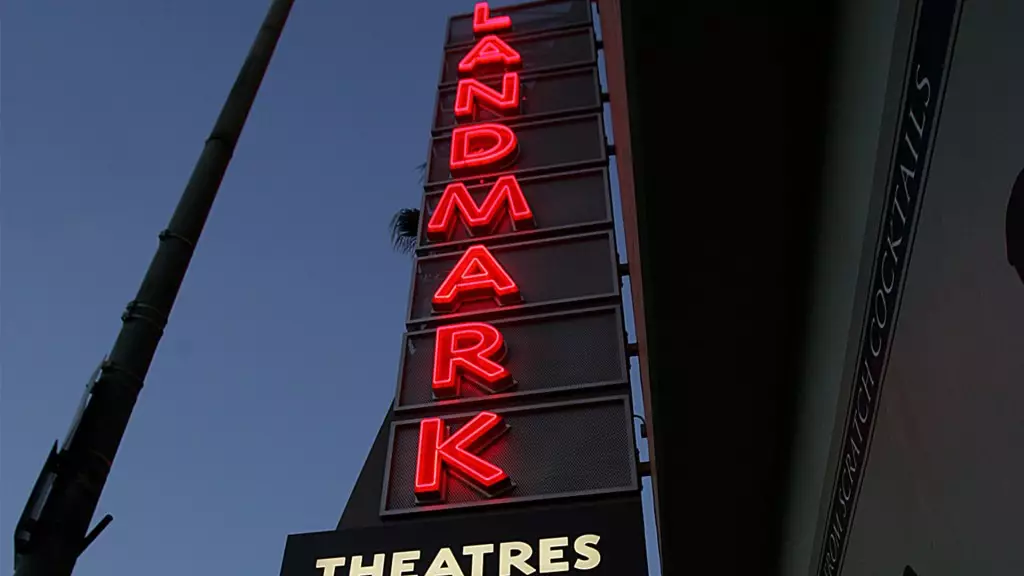In the rapidly evolving entertainment landscape, the fate of Landmark Theatres serves as a stark reminder of the vulnerabilities that traditional cinema chains face. The company, once a bastion of independent film exhibition, recently found itself embroiled in financial turmoil resulting from a confluence of factors: the COVID-19 pandemic, escalating interest rates, and widespread labor strikes in Hollywood. This ordeal highlights the fragility of the film industry, as well as the potential fallout when economic and operational pressures converge.
Landmark Theatres’ troubles can be traced back to the onset of the COVID-19 pandemic in 2020, when theaters across the United States were forced to close their doors. This unprecedented cessation of operations undoubtedly disrupted revenue streams, leading to a deep financial crater that would take years to heal. Landmark, having acquired the renowned arthouse theater chain from Mark Cuban and Todd Wagner, found the timing of its investment particularly unfortunate. The pandemic not only kept audiences away but also hampered production schedules, resulting in a backlog of films that theaters depend on for foot traffic.
While some theater chains struggled to adapt by emphasizing alternative content delivery methods—such as streaming—Landmark continued to emphasize its traditional business model. When audiences eventually returned, their cinematic preferences had shifted; many were looking for newer, unique experiences that an arthouse environment could provide but were also affected by their changing entertainment habits. The traditional theater experience, characterized by communal viewing, was dissected by the burgeoning popularity of home streaming.
As the industry tentatively reopened, other challenges emerged. High interest rates complicated financing options for theater operators, adding pressure on their already strained budgets. Landmark was no exception, highlighting in court proceedings that net revenues had plunged dramatically. With estimates showing more than $14 million in losses, the theater chain’s trajectory looked precarious.
Compounding these financial woes, the Hollywood strikes in 2023 effectively stalled film production, leading to further underperformance of cinema outlets that rely on a steady stream of new releases to attract audiences. The dual impact of absent films and increased operational costs subjected Landmark to additional scrutiny from its lenders, particularly Fortress Credit Corp., which pushed for accountability and settlement regarding Cohen’s outstanding financial obligations.
The ongoing litigation between Landmark’s owner, Charles Cohen, and Fortress has unveiled alarming practices aimed at protecting assets from creditors, further complicating the narrative of failure. Cohen’s deposition revealed alarming truths about the extent of reduced asset values, with estimates suggesting a loss into the hundreds of millions. As the court proceedings unfolded, Fortress made a case to restrict Cohen’s asset transfers, demonstrating the lengths to which creditors will go to recuperate losses.
Remarkably, Cohen allegedly shifted significant personal assets—valued at over $70 million—just after the onset of litigation. These transfers, including luxury properties and high-value boats, raised red flags and ignited a narrative questioning the ethical integrity of his business practices during a period of distress. Whether intended as protection or mismanagement, these maneuvers can further fracture confidence in the leadership at Landmark, showcasing the complexities of operating under financial duress.
As Landmark Theatres navigates its impending auction and legal maneuvers, questions arise about the broader implications for independent cinema. The industry is undergoing a major transformation; audiences are increasingly attracted to dynamic viewing experiences, making traditional arthouse models less viable in a world shaped by innovation and fluctuation. The loss of Landmark’s flagship locations, such as their Westside LA venue, signifies how rapidly perceptions of the cinematic experience are shifting.
This scenario emphasizes a critical need for adaptation. While the charm of independent films remains potent, theater chains like Landmark must reevaluate their operational strategies, merging marquee attractions with innovative programming that resonates with younger demographics. By aligning with evolving consumer preferences, they stand a chance at revitalizing a model that once defined cultural cinematic experiences.
The journey of Landmark Theatres encapsulates a myriad of challenges inherent within the film industry, showcasing how external shocks coupled with internal mismanagement can lead to disarray. However, there remains hope; resilient operators can adapt, innovate, and future-proof their offerings in a continuously changing landscape. As Landmark heads toward its auction, industry stakeholders must draw lessons from this narrative—encouraging a renaissance of creativity that reclaims the glory of independent cinema for generations to come.

